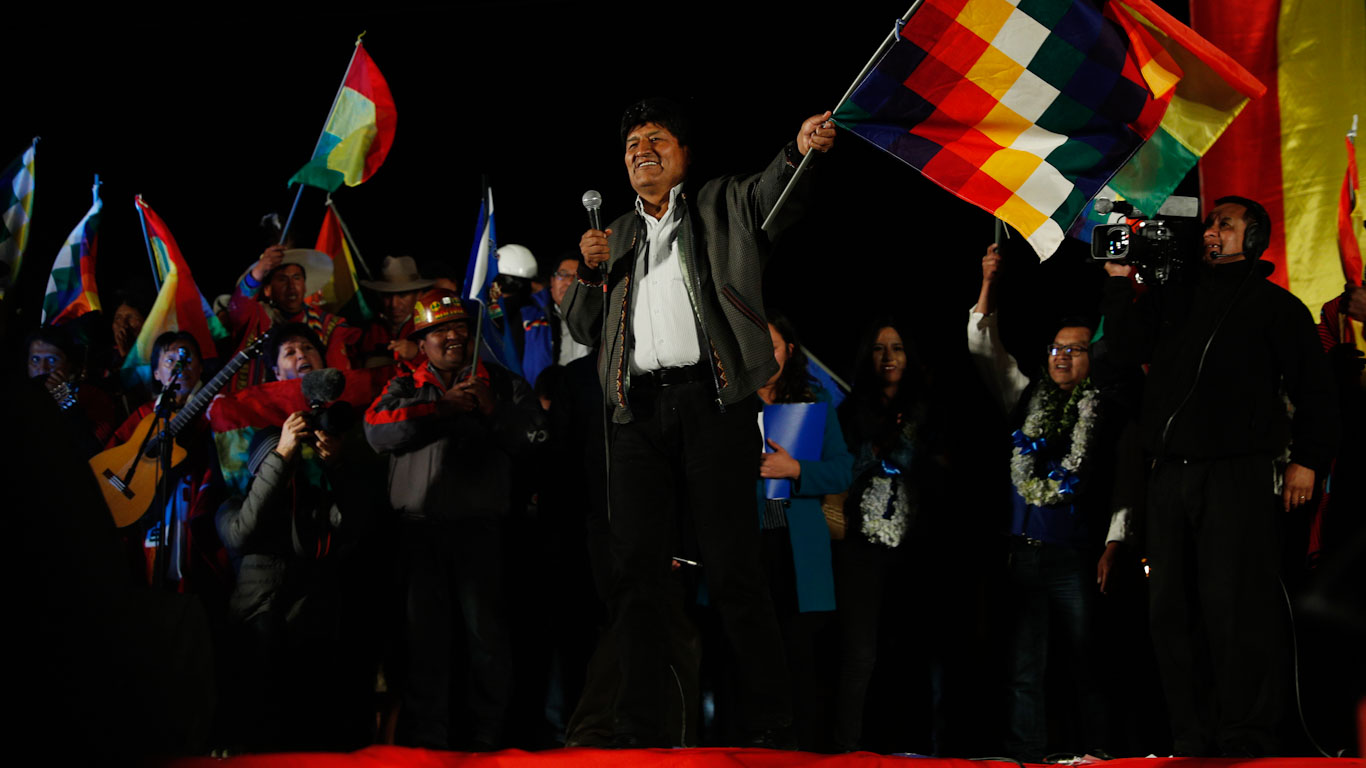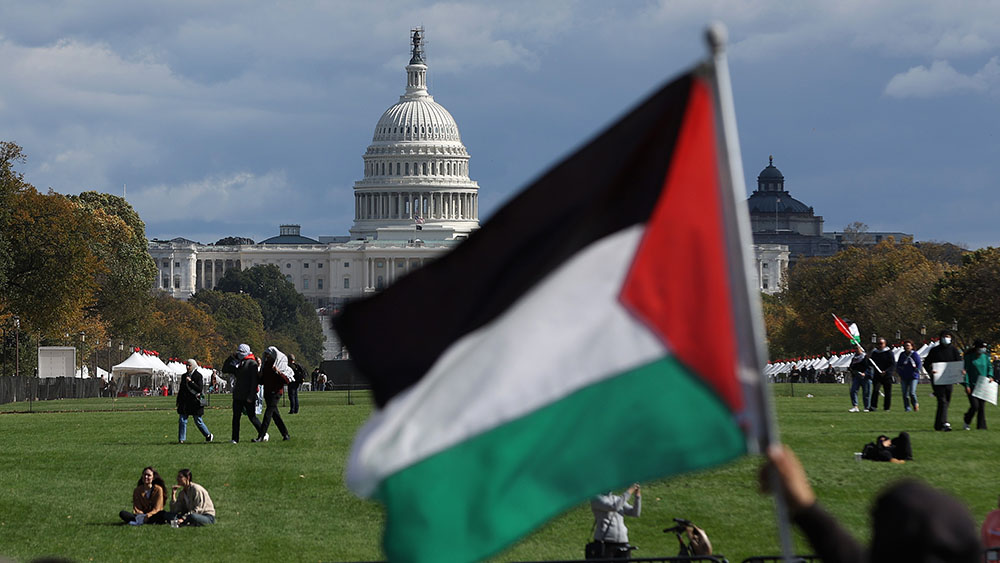Bolivia Is the Latest Successful US-Backed Coup in Latin America
by Alan Macleod, MintPress News:

Bolivian President Evo Morales “resigned” at gunpoint Sunday, after army generals publicly demanded his resignation, despite convincingly winning re-election just three weeks ago.
The preceding 21 days were filled with fractious demonstrations and counter-protests from Morales’ supporters and opponents. On October 20, Morales had secured enough votes to win the election outright in the first round without the need for a run-off against his closest challenger, Carlos Mesa. However, Mesa cried fraud, citing supposed irregularities in the vote-counting procedure, claiming Morales did not receive the requisite vote share to ensure his victory. The Organization of American States (OAS) and the U.S. government repeated this claim, although neither group provided evidence of fraud. Morales invited the OAS to audit the election as he was confident of its veracity. Indeed, a report by the Washington-based Center for Economic Policy Research found that the vote totals were “consistent” with those announced, finding no irregularities whatsoever. Despite this, the local U.S.-backed opposition went on the attack.
Right-Wing Rampage
On Saturday, veteran political scientists Noam Chomsky and Vijay Prashad warned that “a coup is brewing against the elected government” of Bolivia, expressing their concern at the “fascistic” violence percolating throughout the country. In Santa Cruz, a stronghold of the wealthy white elite who oppose Morales, the office of the electoral authority was burned down. Meanwhile, in Vinto, opposition groups kidnapped local mayor Patricia Arce, cut her hair off and painted her body red, publicly dragging her through the streets and abusing her, forcing her to commit to leaving office.
#Bolivia | Mayor #PatriciaArce was forced to walk barefoot for several kilometers while listening to sexist and racist comments.#HumanRights #HumanRightsViolation pic.twitter.com/s98E1KyaCD
— teleSUR English (@telesurenglish) November 7, 2019
Victor Borda, President of Bolivia’s Chamber of Deputies, was also forced to resign after coup forces attacked his house and kidnapped his brother.
The squalid US-backed fanatics of the Bolivian right ransack the house of the country’s elected president, Evo Morales. And the havoc is just beginning. Let no one call them “pro-democracy.” pic.twitter.com/rwwvOSAEaA
— Max Blumenthal (@MaxBlumenthal) November 11, 2019
As soon as Morales stepped down, the police, who had refused to serve his government, ordered his arrest and vandals ransacked his house. Meanwhile, the conservative opposition joyously burned the flag of Bolivia’s indigenous people (a majority of the country’s population), in the clear hopes that the coup would mark a return to rule by the white elite who had been in power since the time of the Conquistadors.
La whipala es símbolo de resistencia de los pueblos indígenas del Abya Yala. Esta imagen resume una de las razones del golpe contra @evoespueblo. pic.twitter.com/uN0Nulu5Gv
— Patricia Villegas Marin (@pvillegas_tlSUR) November 11, 2019
The United States Applauds the Coup
The Trump administration released an official communication Monday, not just endorsing the coup, but all but stating “we did it.” “The resignation yesterday of Bolivian President Evo Morales is a significant moment for democracy in the Western Hemisphere,” it read, claiming the events constituted the “preservation of democracy.” It also sent a clear threat that more regime change operations were to come, and they already knew who the targets were:
These events send a strong signal to the illegitimate regimes in Venezuela and Nicaragua that democracy and the will of the people will always prevail. We are now one step closer to a completely democratic, prosperous, and free Western Hemisphere.”
Secretary of State Mike Pompeo also welcomed the events, claiming that Bolivia could now be “ensured free and fair elections.” Michael McFaul, Professor of Political Science at Stanford University and former U.S. Ambassador to Russia, was even more pleased. “Morales has fled. Excellent!” he exclaimed on Twitter. The U.S. government has long opposed Morales and his Movement for Socialism party’s agenda of nationalizing Bolivia’s resources to help its people. However, it inadvertently helped him get elected in the first place. Shortly before the 2006 election, the U.S. embassy in La Paz put out a public statement saying it could, under no circumstances, accept a Morales presidency. This enormous election meddling backfired, however, as his polling numbers surged as a result.
While the Trump administration intimates that this will not be the last, the Bolivia case is merely the latest in a long line of U.S.-backed coups in the region. Historian and former State Department employee William Blum calculated that the U.S. has overthrown over 50 governments since 1945, many of them in the region it considers its “backyard.” For example, in 2009, the U.S. supported a coup against the leftist government of Manuel Zelaya, blocking any regional or international response. Hillary Clinton later boasted that, in her role as Secretary of State, she had “rendered the question of Zelaya moot.” Since 2009 the country has been ruled by a right-wing military dictatorship that brutalizes its population, leading to a mass exodus of refugees northward, one of the principal (but unspoken) drivers of the so-called refugee caravan crisis on the U.S./Mexico border. In 2002, the U.S. sponsored and took part in a briefly successful coup against Venezuela’s Hugo Chavez, only for it to be reversed by a massive display of collective solidarity from Venezuela’s people who refused to accept the situation and inspired loyal units to retake the presidential palace and rescue Chavez. Haiti was not so lucky. President Jean-Bertrand Aristide, leader of a grassroots people’s movement, was overthrown in U.S.-backed coups in 1991 and 2004, leaving the nation with a corrupt puppet government that turned the country into the huge, impoverished sweatshop for Western corporations it is today.
Loading...


